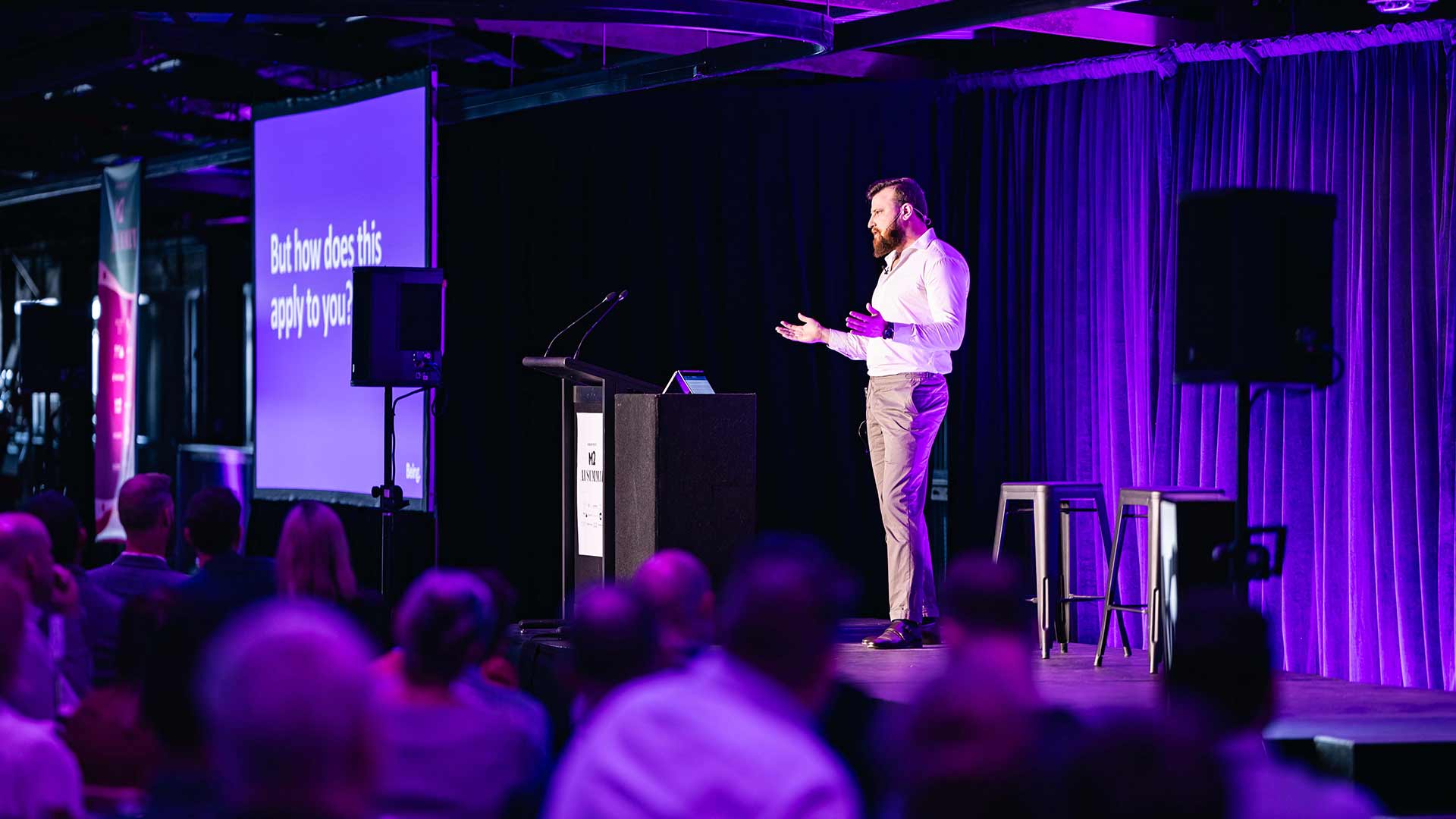Three years of AI Madness and What it Means for Business
David McDonald, co-founder and CEO of Being AI, took the stage at the M2 AI Summit, with a clear message: AI is not just another tool; it’s the linchpin of the next industrial revolution.
“Three years of AI madness and what it means to business,” McDonald began, “At the rate things are changing, three years will probably feel more like thirty and a bit like madness for all of us going through it.” His narrative was not just about the future; it was about preparing New Zealand’s business leaders to navigate the uncharted waters of AI’s rapid advancements.
David McDonald’s career has been as varied as it is impressive. As the founder of Altered State Machine and a major shareholder in Futureverse, he has spent the last decade at the forefront of generative visual and music AI, blockchain, and gaming partnerships with notable names like ReadyPlayerOne, Reebok, Warner Music, Muhammad Ali, and FIFA. In 2023, he founded Being AI, a company that not only builds and patents AI but also advises and supports New Zealand companies on AI adoption, while investing in both legacy industries being transformed by AI and AI-focused startups.
McDonald’s talk was a journey through time, drawing parallels between historical technological shifts and the current AI revolution. He illustrated this with a striking comparison: “On one side you’ve got horses and carriages in 1900, and on the other side, in 1913, you’ve got the streets filled with cars.” This, he explained, perfectly encapsulates the disruptive power of new technologies—a power that AI is now poised to unleash on an unprecedented scale.
The crux of McDonald’s argument was that AI will enable the “previously impossible.” This, however, comes with a caveat: “With previously impossible comes disruption, destruction, confusion, reinvention, and new growth.” He warned that industries must prepare for this seismic shift, not just by adopting new technologies, but by fundamentally rethinking their business models.
To bring the concept home, McDonald shared a relatable anecdote. “It was just a typical day with a bunch of in-real-life meetings mixed in with Zoom calls,” he recounted. Running late, navigating transport options, and coordinating schedules—these mundane tasks illustrated the chaos that AI could streamline. “Imagine an AI calendar with a more human interface,” he proposed, one that could manage real-time updates, coordinate tasks, and even handle travel arrangements autonomously.
McDonald showcased a prototype AI assistant, which he had personally developed in limited time. This assistant was capable of real-time context understanding and could build user interfaces on the fly. “My AI assistant does everything,” he emphasised. “It asks me only what’s absolutely necessary and tells me my next move.” This vision is not just about convenience; it’s about transforming everyday efficiency.
One of McDonald’s most provocative assertions was the impending obsolescence of apps and websites as we know them. “It’s no longer the responsibility of the service provider to present me with an interface to their products and services,” he declared. The future, according to McDonald, lies in AI systems that can negotiate and interact with digital services directly, rendering traditional user interfaces redundant.
He cited a recent announcement from Google to illustrate this point: “Their AI system navigated all the data it needed to perform a task without ever clicking through to a website.” This shift will necessitate a new focus on data organisation, security, and governance. “Your data now needs to be able to negotiate in real-time with my AI,” McDonald insisted.
Looking beyond business, McDonald delved into how AI could revolutionise education. He envisioned a future where AI-driven personalised learning replaces standardised models. “Imagine a future where the traditional classroom is replaced by an AI-driven personalised education ecosystem,” he suggested, with AI tailoring learning experiences to individual needs and evolving in real-time.
McDonald’s keynote was not just a glimpse into the future; it was a call to action. He urged business leaders to think beyond incremental improvements: “Don’t just look for faster horses. Think about how AI will fundamentally change your business model.” He emphasised the importance of investing in skills and culture, focusing on data quality, and maintaining agility to adapt to the rapidly changing AI landscape.
In a follow-up discussion, the conversation turned macro, addressing New Zealand’s unique position in the global economy. McDonald drew historical parallels again: “You can look at what refrigeration did for the agriculture industry in New Zealand in the 1800s. That opened up the world to us.” He posited that AI could provide a similar leap forward if harnessed correctly.


